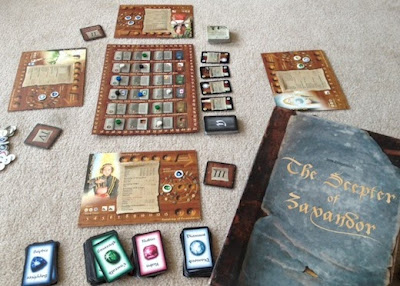A neat auction game with some very nice engine building mechanics is The Scepter Of Zavandor.
In The Scepter of Zavandor, every turn consists of finding ways to improve your income. This can be done in a few ways. First, you can buy better "gems." Each gem produces income for you, so having better gems improves how much money you make (and you can only have a certain number of gems, so you will need to upgrade them). Second, you can auction artifacts. The various artifacts can provide you with additional gem slots, give discounts on future items, increase your hand limit (how much money you can carry over from one turn to the next), etc. Finally, you can improve your "knowledge." Knowledge allows you to have various bonuses - a temporary boost of gems, unlocking better gems, increasing your base income, and providing you a better price when buying gems. Ultimately, the game continues with players seeking to maximize their income every turn until a certain number of "sentinels" (super artifacts that are worth a lot of points) are purchased. Once that happens, players add up points - from gems, artifacts, sentinels, and knowledge. Whoever has the most victory points (most likely the person with the highest income) is the winner!
So, let's start out the pro/con section for Zavandor with this statement - I like a lot of things about this game. First, I really like that you get a varied income from gems. What this means is that each gem does not produce a set amount of money. For example, you don't get $2 every turn for having an opal. Instead, each gem provides you a card, and the cards have a range of values, with the better gems obviously having higher values. This does a couple of things - first, it gives you some turns where you are able to have a "better" turn than you should (though at the cost of probably having turns later that are "worse" than they should be). Secondly, it prevents your opponents from knowing how much money you have. And this second element is very important in an auction game. Now, instead of knowing that they can outbid you at exactly $52, your opponents know that you have somewhere around $40-60; but they don't know any more than that!
 |
| Various artifacts to be sold |
The next thing that I like about the Scepter of Zavandor is that it is really fun to try to get your financial engine going. If you really enjoy one decision building on the next, and having one purchase pay off throughout the rest of the game, then Zavandor will have a lot of appeal to you. I enjoy this kind of system, and so I have enjoyed selling gems in order to get better gems, carefully planning which auctions I need to win versus the ones I can hold back on, and where to improve my knowledge to get the most impact for my money.
The last two pros that I will mention briefly are these: I like the diverse starting position where each player starts with a different piece of knowledge (and thus should have a different initial strategy), and I like that the discounts provided by purchasing artifacts at the beginning of the game encourage you to buy a wide variety of items.
 |
| One of the different player boards |
The second con that I have for the Scepter of Zavandor emerges because of the previous con - the game is far too long. Having an engine building game in which early decisions are unforgiving is completely fine. It encourages you to make good decisions throughout the game! But, more specifically, they are fine in a 30-45 minute game. Zavandor is advertised as a 90 minute game, but I think is closer to 120-150 minutes as average. Yet, the last hour (or more) of the game might not have any real impact on who wins or loses the game. It can wind up being an extra hour of the player in first pummeling everyone else, while they watch helplessly (and with ever-increasing frustration).
Overall, I give The Scepter of Zavandor a 6.5/10. As I keep saying - there are many aspects of this game that I think are wonderful, and that I enjoy greatly. But, with how badly the leader can runaway with the game (and with how long everyone else in the game has to suffer), I just can't justify giving the game a higher score. (Really, I think it speaks highly for the game that it gets a score this high while having such a frustrating element!)
If you enjoy auction games, you might also want to check out For Sale, Modern Art, and Biblios.








